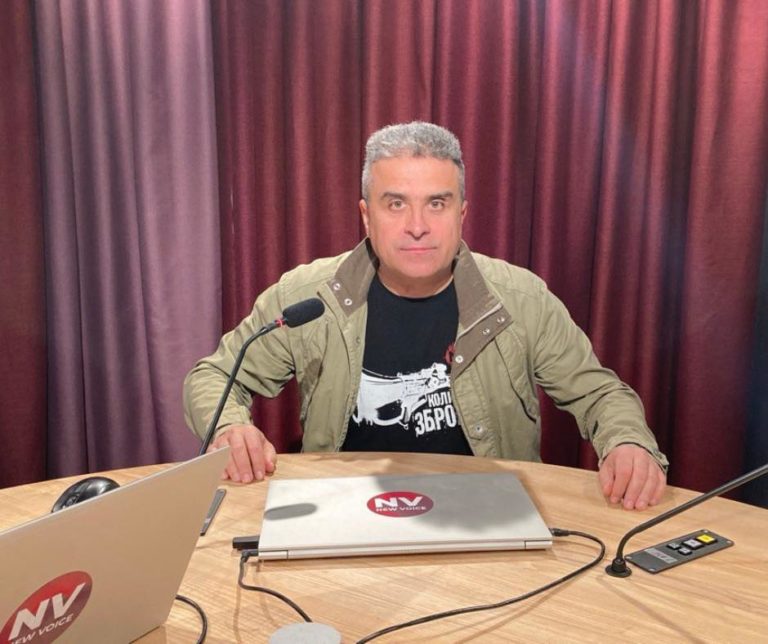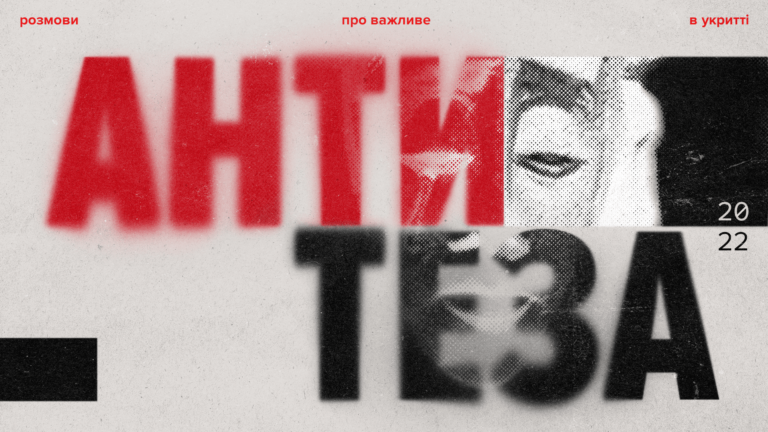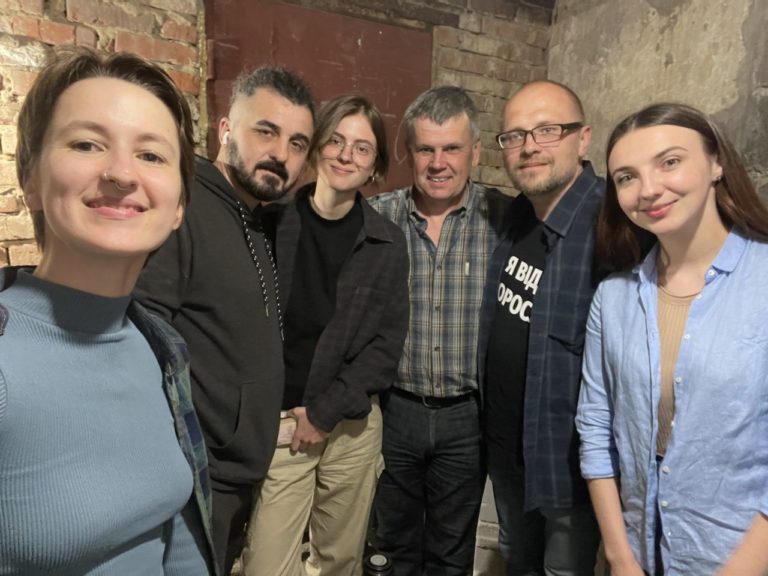“Antithesis” is a series of conversations in which we are not afraid to talk openly about things as they are, reflect on the circumstances, and express our attitude toward the war and the events leading to it.
On Monday, April 18, we are in the shelter with Oleh Kryshtopa, a Ukrainian writer and journalist, and the author of the popular channel “History for Adults.” Ivan Tsyperdiuk and Ira Mykhailchuk hosted the conversation.
Text in Ukrainian: Darya Khrystyniuk.
Interpreter: Taras Omelchenko.
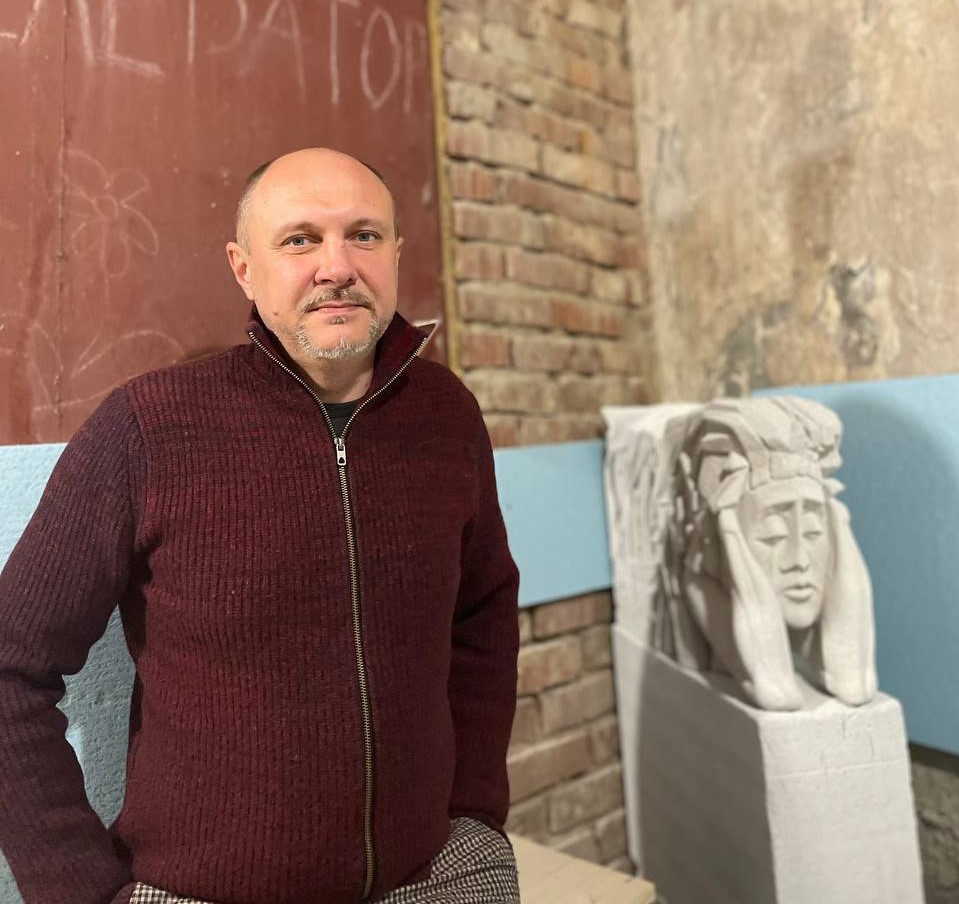
Ivan Tsyperdiuk: Oleh, it’s good to have you here. Today, as nearly every day, we have a tragic, unfortunate event – a morning bombardment of Lviv, one of our cultural capitals. In light of this sad information, I’d like to ask you this: what is safety to you? Where do you feel safe now?
Oleh Kryshtopa: It’s a difficult question because I woke on February 24 to the sound of explosions just outside the windows of my dacha near Kyiv, near the town of Vasylkiv, with two airfields nearby: on the left and the right. I got up, looked out the window and the first thing I saw was the soil rising up into the sky. It was hardly a feeling of security. There’d been talk before the war. No one seriously believed it would come there, but there’d been talk of it: “Well, we’ve got an airfield here, and it won’t be safe here. So where to? To our parents’ place in Ivano-Frankivsk.” But on the other hand, you can’t feel physically safe anywhere at the moment. So, probably, at home.
ITs: So, you felt all this horror of missile fire at the dacha in Kozhukhivka, but you’d had a similar experience before. As a journalist, you went to Donbas at the beginning of the war in 2015-16. You’ve been through the mill, and you know what shelling is. Is there any difference between the shellings?
OK: There is a difference. That was already a protracted war when I was there, in Maryinka and Krasnohorivka. Everyone may have heard these place names. At the time, it (shelling) was non-stop.
When we arrived in Slovyansk, there was a rotation of journalist groups, and the group that was to leave had cooked a barbecue earlier in the evening. My driver, Taras Shevchenko, with whom we’d been detained at the russian border and where they wanted to charge us with exporting revolution, came to say goodbye: “Oleh, you’ll see tomorrow that this here is an entirely different life; you’ll understand everything tomorrow.”
The following day we arrived in Maryinka, and we heard sounds like a hammer hitting the pavement. It was a surprise, but it was peanuts compared to missile fire. Next door, kids were on their way to school. It struck me: “Oh, the children are going to school.” I tensed up: so this is what’s normal.
On the front lines, the boys said some 400 meters away, they [the other side – ed.] had fired shots at each other: “We saw them shoot one of their own on a boney pile.” “They” was a euphemism they used. Although sometimes they also said “separatists.” However, not only separatists were there but also muscovites.
It stunned me that over there, beyond the boney pile, was Donetsk. I remembered this Donetsk very well before the war, I’d also visited there often, and now it was beyond the boney pile, and you realized you had no idea when you’d go there again or if you’d ever visit it. But it was for real: you could hear a machine gun crackling somewhere far away, and the mines falling. And then they said 450 meters was very far.
ITs: The missile attacks… Everyone says a missile produces a particular sound, flying. People are terrified, and this feeling is hard to shake off.
OK: Right, I didn’t see it (the missile) flying, but the explosion was much harder – you’ve never heard anything like that in your whole life. And also this feeling of insecurity in the vast areas: their missiles can fly more than a thousand kilometers, and you are not in Frankivsk, or even Zakarpattia, and not in Chernivtsi, and even if you go to Poland, they can still reach you there: “From Lisbon to Vladivostok.”
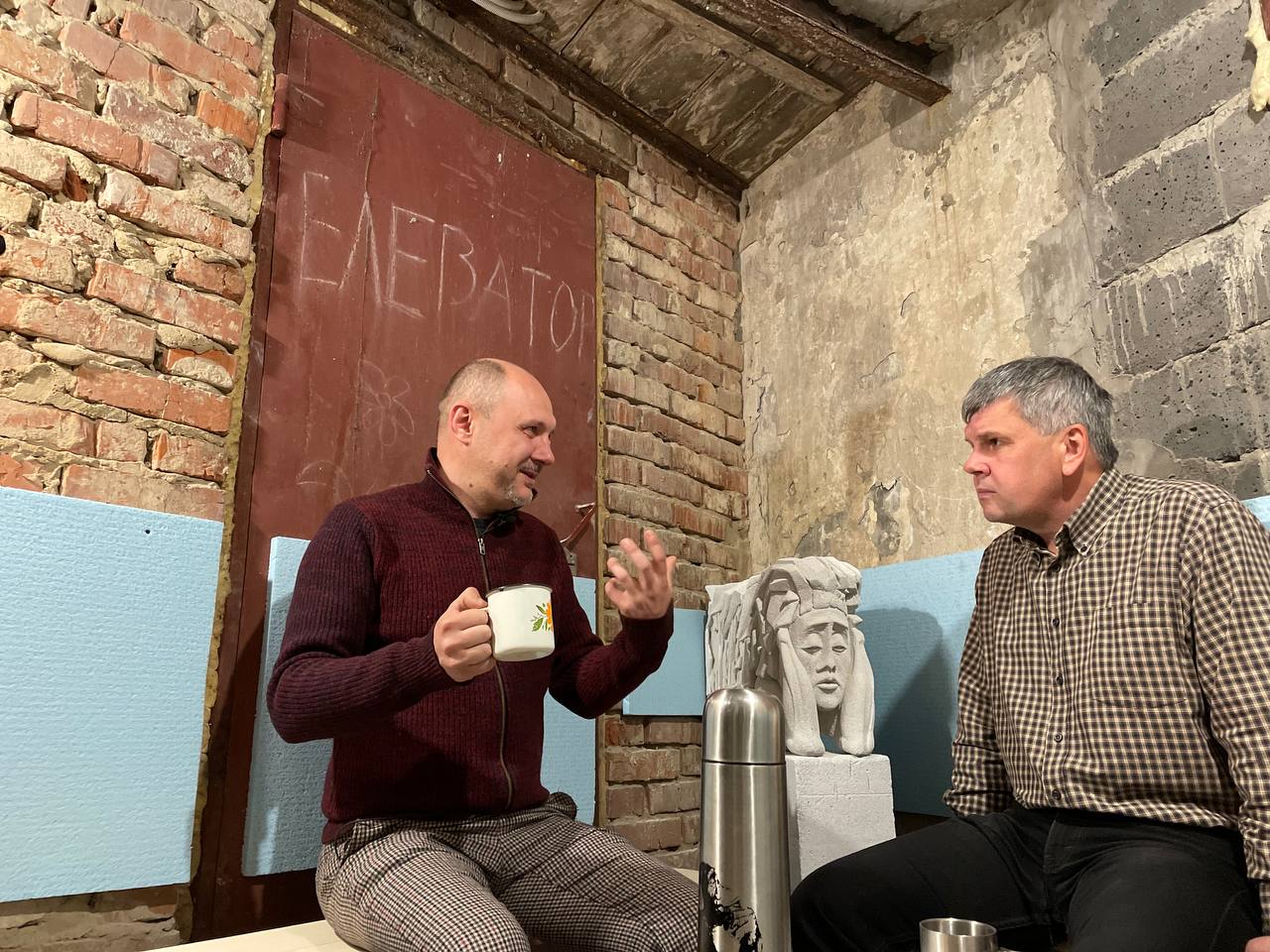
ITs: Let’s go back to the historical perspective. As a host of historical programs, can you say which russian narratives impress you or even make you mad? What’s most expressive about them?
OK: Impress me? Nothing impresses me anymore. Make me mad? Nothing of the kind. There was constant talk about some red lines. There are no red lines anymore. I mean, everything’s been violated. The nuclear bomb has not been dropped yet. Probably, that’s the only thing that can impress me.
ITs: It might, God forbid, impress us all.
OK: Everyone was discussing Putin’s article about us being the same people. Maybe not everyone, but at least all those in the russian military, because it was their task. They had to read it and understand it.
This myth about the same people is a pile of tales gathered in this stupid article. All the myths of the non-existent russia, as I like to put it. Ever since the moscow principality separated from the Golden Horde, these myths have emerged over the centuries, adding new details. Now they’re part of a hodgepodge.
In the 21st century, but then Macron says he sat at a long table, listening to Putin’s historical time travel stories for six hours. And for them, Europeans, it’s not clear, it’s like the past, and everyone has a different past. He even believed some of it (he’d spent six hours listening to that) and began talking about fraternal peoples. But it’s dangerous that they believe in that. We need counterpropaganda, the historical truth, because ignorance of history does not release us from responsibility, as I like to say. These (Ukrainians and russians) are entirely different peoples with completely different cultural and civilizational backgrounds.
That is, russia is merely a fragment of the Golden Horde. Their favorite Marx wrote a lot about it, saying the muscovite identity miraculously combined slavery and the Mongol rule.
ITs: Let’s go over historical myths. In recent years, the following myth about the russian army has been fed a lot: “invincible, fantastic, noble.” What can you say about it?
OK: From a historical perspective, the invincible army (the same myth) was first mentioned in 1853, when Shevchenko was in that army wile in exile near Orsk. That army was already insane, with its audacity and permissiveness.
The emperor goes: “Oh, the Turks are weak, and Constantinople is ours.” He seriously discussed how to divide Turkey (Ottoman Empire) with the British. He was told there were some international rules of the game, and he couldn’t do it like that. He said without so much as a shudder: “It is possible,” and, with foreign ambassadors watching, they fired on Sinop and invaded the territory of Turkey.
The British, the French, and the Turks formed a coalition and beat them in the small Crimea. They kicked their butt so nicely that the invincible Sevastopol (another myth) that never surrendered did surrender.
That is, the army was defeated, and the disgraceful (as they put it) peace agreement was then signed. Mykola Palkin, or, as Shevchenko called him, “Brakes,” died ingloriously. There were rumors of suicide. That’s the first story that comes to mind about the invincible russian army. Then they spent decades rebuilding this army. After they did, they rose from their knees again, and voila, the Russo-Japanese War.
ITs: A great episode.
OK: The Russo-Japanese War, yes. The invincible russian fleet, Tsushima… “Our proud Varyag does not surrender to the enemy.” By the way, there’s a version that they sank the Moskva missile cruiser themselves because they thought that even if they towed it to Sevastopol, it would be sitting there ruined as a reminder.
ITs: Well, the Second World War.
OK: Wait, the First World War first. Khuylo [Putin – ed.] never tires of repeating that they lost it. Lost, yes. They did lose it. Nicholas II had come to Lviv (“reunifying the russian world”) wanting to show it was the same people. But it didn’t take Lviv long not to tolerate this one people thing.
The Finnish war afterward. There are obvious parallels here. The ratio of tanks was even worse at the time than ours to theirs now, and the ratio of aircraft was about the same as now. They (russians) had over two thousand aircraft against less than two hundred Finnish aircraft. But, as it turned out, the russian soviet army was an excellent provider of weapons. When asked who supplied weapons to them, Mannerheim said: “The Soviet Union!”
ITs: The Finnish war ended like that: Finns lost 20,000 and [russians] over 130,000…
OK: The exact figure is unknown because they keep hush about how many were frozen, how many were taken prisoners, etc. There are figures of up to 400,000 casualties, including the wounded, frozen, and those with amputated limbs. That’s a different story, but, as a man from Zhytomyr told me beautifully (a considerable number of Ukrainians from Zhytomyr had been thrown into the second phase of the war): “So they know, and their parents remember what it means to lose the war.” And that’s what the muscovites are doing in the occupied territories. They are beginning to mobilize people. Like, you don’t want to fight for yourself? Then fight for us, the occupiers.
ITs: During World War II, which we’ve now logically come to, they created a tremendous soviet era myth about Ukrainian collaboration. But, in fact, they actively collaborated with Nazi Germany themselves. Please say a few words about this historical episode.
OK: There are many episodes. They constantly talk about Ukrainians providing the entire “Halychyna” division but never say a word about four or five whole russian armies. That is, the entire soviet union provided more than a million collaborators (about one and a half million), of which one million were ethnic russians, even though the Germans had occupied all of Ukraine and only a small part of russia.
ITs: They really are genetic traitors.
OK: There are different explanations, including that Sovok had really gotten under everyone’s skin so much they were ready to…
ITs: That sounds like a normal reason.
OK: Right. When, for example, the Lokot Republic started with Voskoboynik, a Ukrainian who’d long hidden from the soviet authorities and ended up there creating self-government. That’s how everything started, but then he was killed by soviet partisans. He was replaced by a real traitor, a half-Russian-half-German Bronislaw Kaminski whom the SS shot for excessive cruelty in suppressing the Warsaw Uprising.
Just think about it. Everyone knows about Vlasov, about the russian liberation army, but there was also the russian people’s army, the russian people’s national army, the russian national liberation army, and the kazak corps… In short, that’s a massive number of units.
There’s this russian philosopher Ilyin, an emigrant, Putin’s favorite. He was effectively the ideologue of russia’s official fascists, who called themselves exactly the russian fascist party. It’s so you understand who inspires them in their current ideology.
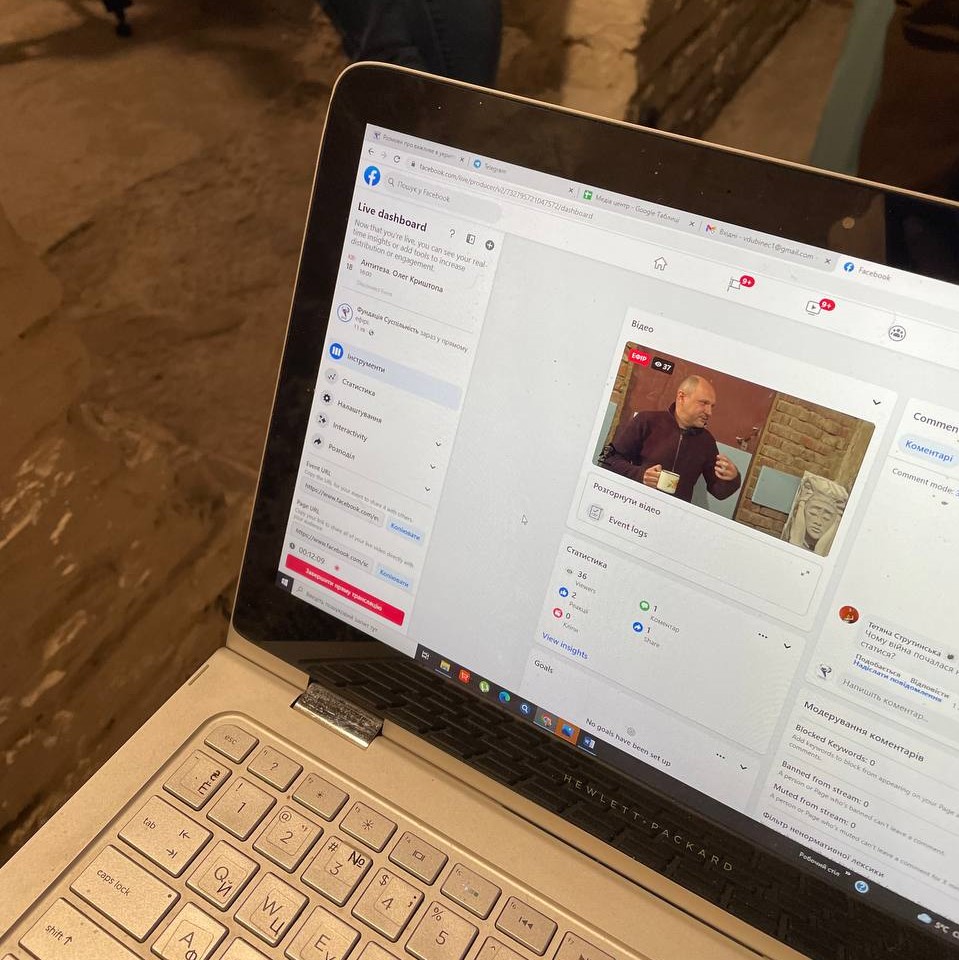
ITs: We’ve been chatting for a while now, but what are the social networks saying?
Iryna Mykhalchuk: User Tetiana asks: Why did the war start in Donbas, and how come it became possible?
OK: Because Donbas is an ethnically diverse region. There were indeed large numbers not of just russian-speaking people but also ethnic russians there.
I heard Portnikov talk about the russian language as an instrument of aggression. All this russification continued for many decades with an intention to later claim the area to be their territory.
By the way, the russian empire censuses contained no such column as “Nationality” but “What language do you speak?”. Therefore, we can use those census results to determine where our ethnic territories ended, so to speak.
Why, in 1919, when there were peace talks in Paris, and the UPR delegation arrived… Why did we claim Rostov-on-Don and partly Kuban? Because of the census results and because people spoke Ukrainian, which was a marker of identity.
That’s why they’re talking about the russian world, trying to stuff [us with] their Dostoevsky, because it’s also a marker of promoting cultural space. And Donbas was a very particular region. We’ve got to admit that it was and probably remains even more specific, especially in the occupied territories. There’s brainwashing there. Just think about it: children who started school eight years ago are almost adults now.
ITs: Why is there such a de facto racist dehumanization of Ukrainians in today’s russia? Is it there to make it easier to kill them in a war?
IM: And why are we, Ukrainians, such a lump in their throat? Particularly to Putin?
OK: I have a theory that russia doesn’t even exist. What is russia? It’s a stolen name of Rus, a Greek version. They invented the construct after the Battle of Poltava that we lost, including Feofan Prokopovich.
The then moscow tsar adopted this, I mean, he was a regular guy because where did moscow princes get the title of czar from? Remember the soviet movie about Ivan Vasilyevich? “I seized Kazan, I seized Astrakhan…” I mean, to become czar, he conquered two territories, i.e., other fragments of the Golden Horde, namely Kazan (the capital of present-day Tatarstan, part of the russian federation) and the Khanate of Astrakhan. Because of this, the Crimean Khan came to burn down moscow, and Ivan the Terrible shamefully fled from him.
They were the czars of fragments of the Golden Horde, but they desperately wanted a mythical claim for Rus. However, all claims were unfulfilled without Ukraine because the Rus roots were important to them, for some reason. Therefore, they had this myth they forged for decades. It all started with claiming some lands, all those Livonian wars, wars with the Grand Duchy of Lithuania for some small territories, and then Khmelnytsky finally came to sign the agreement. Also, the ideology was adjusted after the Battle of Poltava.
There is no such formation as russia without Kyiv, without Ukraine.
ITs: In truth, the imperial myth is fiction.
OK: Yes, and it’s still the last large, territory-focused empire. The territory is vital to them.
IM: User Viktoriia asks: is there any chance that russians will ever write their true story?
OK: Like I said, the term “russian” won’t exist then. They’ll get back to “muscovites.” Muscovites will write their history someday, and Tatarstan will write its…
ITs: Everyone will finally have their own territorial association.
OK: Yes, one day, maybe, they might finally succeed. They also differentiate between “Rus” and “Russian.” The russians are those scattered across a vast territory, including enslaved peoples.
ITs: I can see that many tank drivers are from Buryatia.
OK: They deliberately sent as few moscow and st. petersburg residents as possible to this war so that the empire’s two great centers would not see dead bodies and funerals as this might somehow instigate them. But Buryatia, Dagestan…
ITs: They don’t matter to them.
OK: Yes, too far away, no one even sees, that’s why it’s like that.
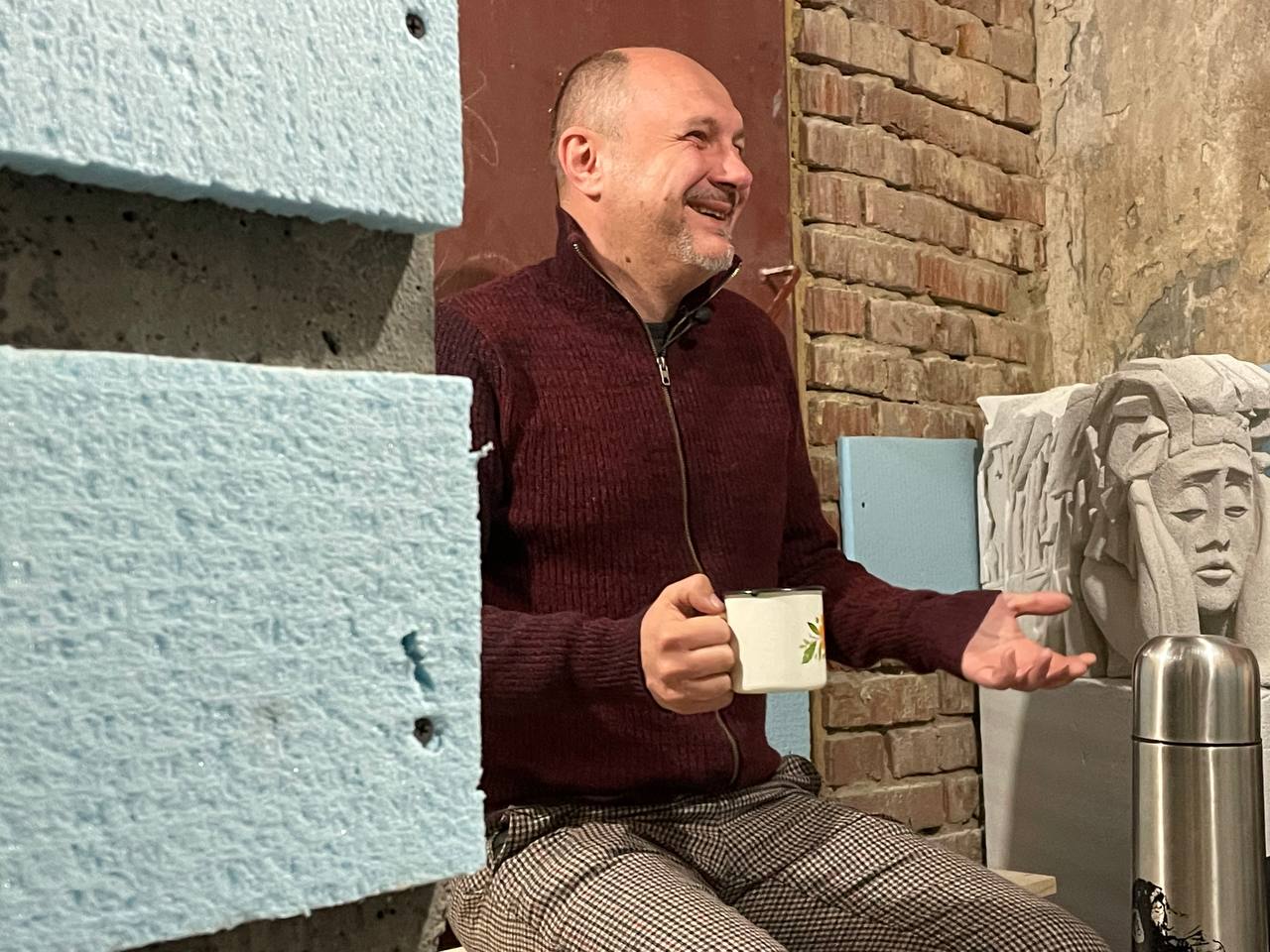
ITs: Let’s get back to the relatively recent history, to the history of the UPA, often mentioned these days. Because throughout the existence of the Ukrainian State, one way or another, the UPA struggle had to be explained in different ways: why these boys and girls fought against the soviet union, Germany, and the Poles.
They only fought against the soviet union, the soviet army, and the NKVD, with no prospects in sight in their last period. As it turns out, everything they did has a continuation today. How do we connect the UPA struggle and our current liberation war historically? Hopefully, it’s the last liberation war against the muscovites.
IM: And why does Bandera frighten the russians so much now? A man who never fought a day.
OK: They can’t pronounce his name correctly, saying “Bendera followers” or “Ostap Bender,” whom we mentioned earlier today. I don’t know why it scares them so much.
There is a popular version that when the KGB finally killed Bandera with the help of Stashynsky in Munich, one of the KGB generals said, “Now we’ve turned him into a nationalist Jesus Christ.”
He (Bandera) was indeed a man who was a symbol throughout the war. He was in a concentration camp from 1941 to 1944, when the KGB successfully created divisions within the OUN. He had little influence on the situation in Ukraine, or better yet, he did not influence it at all. Roughly speaking, he remained a symbol, and by killing him, Stashynsky added to his halo.
ITs: But going back to the Ukrainian guerrillas, to the UPA, to these ordinary boys and girls who understood that their struggle – I don’t know how they counted themselves – would somehow be appreciated one day – what do we owe them now, in this war?
OK: I’ve read many times in the memoirs that even initially, there was hope for success in the battle of Hurby, when there was a large UPA unit.
Why did the battle of Hurby take place? Actually, it’s an interesting story because they had a huge unit, Kholodny Yar, that was supposed to wait for the front line to pass and then immediately go through the forests of Volhynia, the so-called Kremenets forests. One group went north, and the other went south. They were to reach the Cherkasy region, the real Kholodny Yar, the same Kholodny Yar Shevchenko sang about, and later Horlis-Horsky wrote about in a novel from the time of the UPR underground. And they had to raise a new rebellion there, and that was central Ukraine.
I’ve been told the OUN was active in the Bohuslav region and Donbas. That is, there were not millions of them, but it was an active military organization that had enough influence for that.
That was probably a turning point when an entire army… more than 30 thousand NKVD members had been sent into the woods to surround these forests like a ring, getting narrower and narrower. They also sent front divisions (withdrawn from the frontlines), planes, tanks, cannons, and whatnot. Yet they managed to miss these units in the Hurby forests. They killed the wounded, nurses, and ordinary people who’d fled the villages for the woods because of the raids.
ITs: As part of their never-ending “wonderful” sadistic style, they killed the defenseless in the first place…
OK: …because they could not cope with the army.
ITs: Oleh, I’d still like to ask you because I know that one of your programs, “Time Machine,” airs on Channel 5….
OK: Not at the moment. Temporarily, I hope.
ITs: We hope it’ll be back soon. But, when mentioning the guerrillas, there was this fantastic episode about the radio “Aphrodite.” How did such media phenomena appear at a time when it would seem that the guerrillas could not have such a powerful and charismatic radio station. How did it all come about?
OK: Shukhevych himself played a role in it. It was his idea. Besides, there was this propagandist, Yaroslav Starukh, the only one with experience in operating a radio station in Lviv during those few days in June and July when Ukrainian statehood was proclaimed. That is, from June 30 to July 2 (when all of them were arrested by the Gestapo). He oversaw the station for three days, which was a solid experience in wartime, of course. Starukh was released from the Gestapo prison in the center of Lviv by Shukhevych’s order.
ITs: They could even pull that off to get people out when necessary.
OK: Yes, when necessary, they could even do that. The special operation was carried out at the highest level. They revived him. His hair was gray, and he received such a nickname at the age of 30 because he’d turned gray from torture.
So it’s Shukhevych’s idea and Starukh’s implementation. The first radio station was bought during Shukhevych’s negotiations with the Polish underground, meaning they bought it from the Poles, but it seems to me something did not work there. They stole German generators, and they stole German gasoline for those generators. They set up the radio station in the mountains, and it worked successfully both during the German occupation and the Soviet occupation (43-45), for two years.
ITs: We are slowly running out of time, although the time in the shelter is virtually infinite. What will you do on the day of our victory?
OK: I don’t know, maybe I’ll cry.
ITs: Thank you very much for the conversation. Thank you for waiting out this difficult time with us in the bomb shelter and having a meaningful talk.
You can watch the broadcast on Souspilnist Foundation’s Facebook page and our partner media platforms: KURS, Reporter, and TRK RAI.
